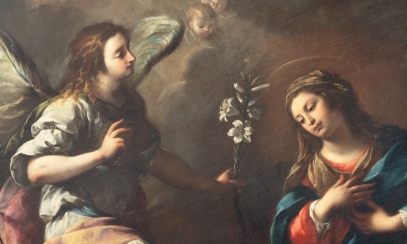
Bishop Boyea's Year of the Bible
Bishop Boyea invites us to enter into a closer relationship with the Lord through hearing him in the words of Scripture. We are encouraged to read a chapter of the Bible each day and reflect on it together with our fellow pilgrims in the diocese. The following reflections from the bishop cover the chapters we’ll be reading from the end of October through the end of November.
Bishop Boyea invites us to enter into a closer relationship with the Lord through hearing him in the words of Scripture. We are encouraged to read a chapter of the Bible each day and reflect on it together with our fellow pilgrims in the diocese. The following reflections from the bishop cover the chapters we’ll be reading from the end of October through the end of November.
Oct. 23-Nov. 5
The Book of Hosea
For the rest of October into November, we will be reading the 14 chapters of the prophecy of Hosea. After the time of David and his son, Solomon, the kingdom split in two: in the north, Israel, and in the south, Judah, centered on Jerusalem. Hosea is a northerner who writes from the time of King Jeroboam II, the north’s greatest king who died in 746 B.C. So, Hosea prophesied from about 750 B.C. to around 730 B.C. It was a time of rapid decline and chaos in the north. Assyria was constantly harassing the kingdom and eventually destroyed it in 721 B.C.
We don’t know very much about Hosea from his oracles except that he was a very passionate man who was deeply saddened by Israel’s situation. This is a bit like Jeremiah, who will preach 100 years later in the Kingdom of Judah. Hosea castigated the kings who succeeded Jeroboam. These charges fill much of Chapters 4 through 9.
But there is a more important point which Hosea wants to make. At the root of the northern kingdom’s problems was its lack of fidelity to God. This can be hard for us to picture. When we think of the Jewish people, we are struck by their solid faith in God. That was not the situation in those days. Most of the people, including the kings, worshiped many false gods, the Baals, the fertility gods of each local community. This is the charge of idolatry which Hosea levels against the people.
Hosea upholds instead a great theological teaching, that God, the God who freed them from Egypt, was their spouse and had entered an eternal covenant with them. Hosea’s own life in Chapters 1 to 3 provide a model. And this is summed up again in the last parts of his prophecies. God has been faithful to us and so must we be to him.
Sisters and brothers, Hosea will even conclude with a message of hope, based on God’s love. It did not end well with the northern kingdom, but God’s promise never ends.
Nov. 6-27
The Book of Revelation
Well, we are nearing the end of our Year of the Bible. For these last 22 days (Nov. 6-27), we will be reading the Book of Revelation. This is my favorite book of the Bible and I have taught a class on this book many times. I know that some may think it a scary book due to the incredible imagery. However, let us keep this in mind: the Book of Revelation is all about the triumph of God. God will win out in the end. The call to us, as we read this book and reflect on its content, is to ask ourselves which side we want to be on.
After a brief introduction in Chapter 1, we are led to hear seven letters from Jesus to Churches in present-day western Turkey. This is then followed by the heavenly liturgy in Chapters 4 and 5. Then ensues a series of seven seals being opened and seven trumpets being sounded from Chapters 6 through 11. The Great Sign of the Woman, Chapter 12, the sign of the Beast, Chapter 13, and the sign of the Lamb, Chapter 14, take us to the concluding rites. These include the end of the Prostitute, Chapters 17 and 18, Christ’s intervention, Chapter 19, the end of the Dragon and of death, Chapter 20, and the general renewal and the Heavenly Jerusalem, Chapters 21 and 22.
People throughout history have tried to see here a blueprint for what was happening in their own times and have made all kinds of claims about this. None have worked out as they thought. This should give us caution as we read this text. Instead, this book contains images and themes which must challenge all of us, in every age, to side with Christ. Much like life today, God’s work in achieving his kingdom may seem to be overwhelmed by evil or confusion. But Jesus has already triumphed.
Sisters and brothers, that triumph of the Lord Jesus needs to be worked out in each one of us. This is a book to move us to rejoice, especially as we say in the end, “Come, Lord Jesus!”
Dear brothers and sisters, it has been a wonderful and spiritually enriching opportunity to be reading my favorite books of the Bible during this past year with all of you. This was meant to be just a year and so we will now shift gears. In fact, we hope in the coming year to help all of us become better disciples of Jesus Christ. However, please do not stop reading the word of God. Please, do not stop encountering Jesus when reading your Bible. Please, do not stop sharing your thoughts with others. And, please do not stop feeding on this wonderful manna which God has given us. Let this reading of a chapter a day become for all of us a healthy spiritual habit to enrich our entire day. God’s many blessings on you all and thanks so much for being on this pilgrimage with me this past year.



